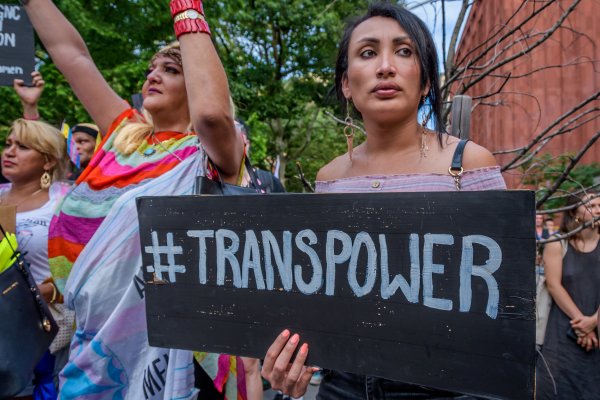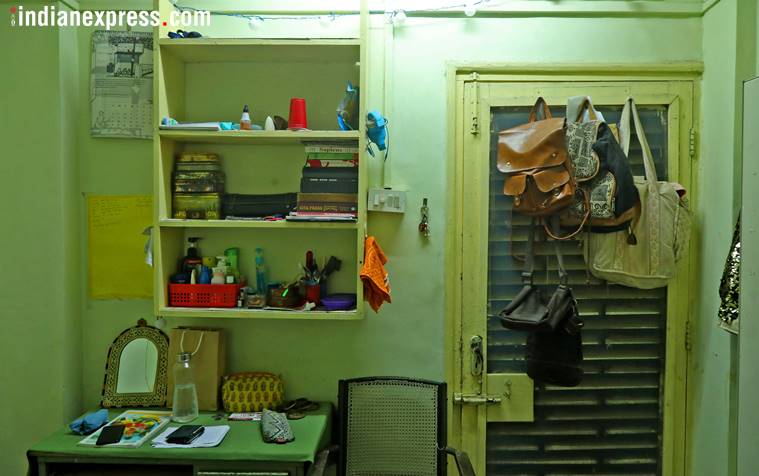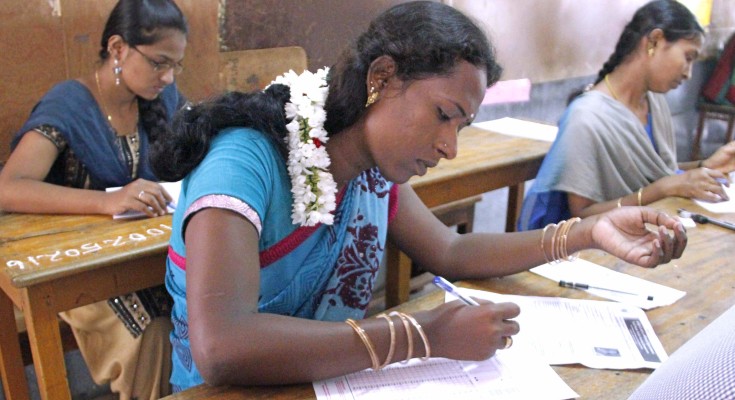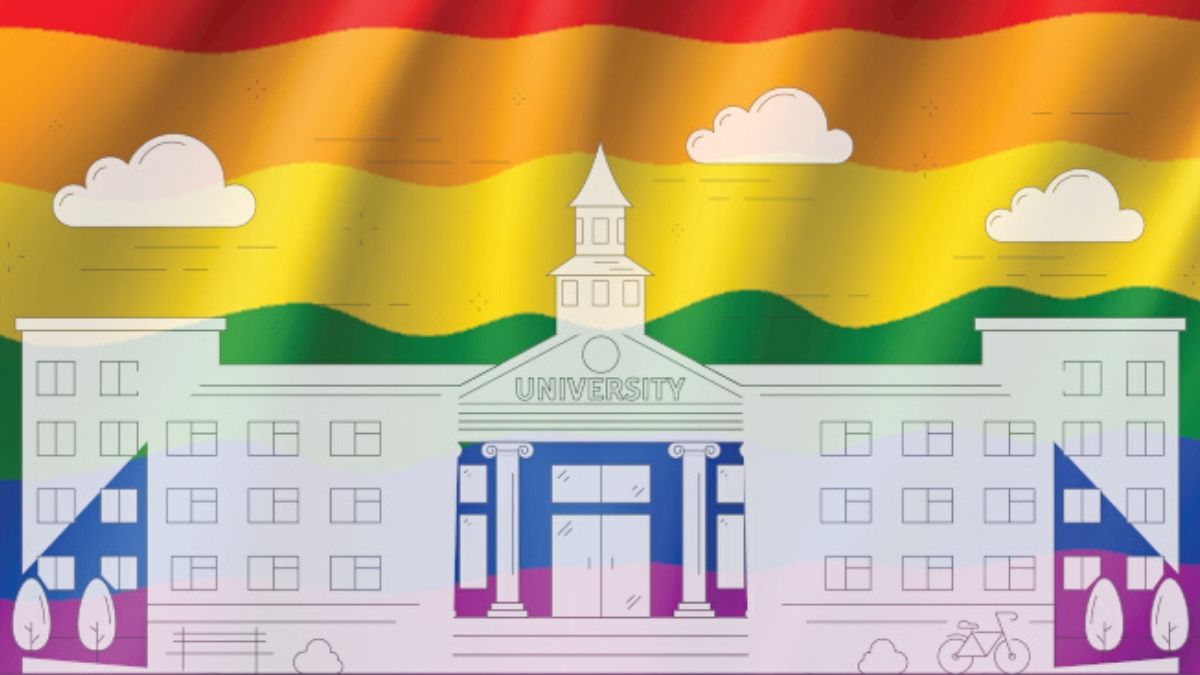Editor’s Note: FII’s #MoodOfTheMonth for June 2022 is Pride Solidarity. We invite submissions on the many layers of this theme throughout the month. If you’d like to contribute, kindly refer to our submission guidelines and email your articles to sukanya@feminisminindia.com
In 2019, Uttar Pradesh’s Kushinagar made headlines as Akhil Bhartiya Kinnar Siksha Seva Trust announced the building of India’s first university for the transgender community. 3 years later, there is no traceable news in major bulletins about the campus’s progress. In 2015, major media houses and magazines lauded the appointment of Manabi Bandopadhyay as the first openly transgender college principal at Krishnagar Women’s College. By the end of 2016, she faced so much resistance and harassment from the college teaching staff that she tendered her resignation.
A few newspapers carried the news as an afterthought, only to come back in 2017 with the news that the education department had rejected her resignation. In her own words, “I am passing through terrible mental agony and can’t take it anymore”. But she was reinstated in her position as the charged staff denied wanting her to resign, and the State did not want to lose a campaign slogan.
These incidents are some recent displays of the State’s tendency to queer wash campuses. But what is the reality of these communities on the Indian campuses? What changes have these spaces undergone in the last decade? Does a trans-inclusive campus ensure the safety or empowerment of individuals from the community?

In 2018, the Tata Institute of Social Sciences, Mumbai, through the efforts of a student body named Queer Collective, flagged off the first gender-neutral campus hostel in India. But the morning does not show the day in a heteronormative sky. Four years later, in March this year, Yashika a 27-year-old Dalit Trans woman was under duress for seeking accommodation in a women’s hostel and being denied the same by the administration of the Punjab University.
Trans visibility’s burden cannot be on the community alone. The campuses, the students, and the administration need to be educated and sensitised to allow the community to thrive in that space. The violence inflicted upon the community, categorically, in every scope of their lives endangers their very existence, let alone academic pursuits
Dr. Trinetra Haldar Gummaraju filed a petition in the Karnataka High Court after being denied a women’s hostel at the Kasturba Medical College, Manipal. Even as the safety of living is at stake for trans and queer individuals, the Nalsar University of Law, Hyderabad, saw the unveiling of gender-neutral spaces, including washrooms, on the campus this year.
Yet, these measures move at a sloth pace, with slower change in the social context for queer and trans-lived experiences. In a report from 2019, released by the Centre to the Lok Sabha, the numbers revealed that 814 transgender students had enrolled in the Indira Gandhi National Open University (IGNOU) but none in the other central universities.
Adding to the weight is the fact that there were no teaching or non-teaching trans staff members in these universities either. It goes without saying that the report does not include the number of trans and queer students who choose to refrain from officially identifying as the same.
Abu Sohel Khondekar, Kolkata-based artist and photographer, reflects the same reality in her words, “Trans presence on campus is very important. But most Trans people on campus live in the margins. A lot of us aren’t even visible because they never make themselves seen.” Oftentimes, trans people hide behind a carefully constructed veneer to avoid scrutiny and interrogation. The responsibility always seems to be on the trans body to justify the space they take up.

Shirsho Basu, a cognitive science research scholar at the Jadavpur University, agrees that they had to overexplain their identity to the gender-conforming majority that occupies the space. “Those of us who are associated with queer or trans activism, in one way or the other… the onus is always on us. Because we have to make people understand, we have to tell them what gender and sexuality is…” “During my time in JU, I knew only one other Trans person.” Abu Sohel shares her experience of studying at the Jadavpur University.
Trans visibility’s burden cannot be on the community alone. The campuses, the students, and the administration need to be educated and sensitised to allow the community to thrive in that space. The violence inflicted upon the community, categorically, in every scope of their lives endangers their very existence, let alone academic pursuits.
Abu Sohel recalls her experience, “I was once prevented from presenting my full paper on the convergence of Standpoint Theory and Intersectionality at the 2018 Annual Queer conference by Sappho. I was talking about how Trans people are in a better position to make laws and regulations for themselves, as we understand our oppression better.” She was jeered for “wishful thinking”.
Even the feminist spaces of the campus and their peripheries continue to marginalise and invisibilise the trans community. Shirsho shares a different academic experience as they did not personally face discrimination based on their gender location, but adds that any occurrence of such prejudiced behaviour is definitely in congruence with the normative biases campuses show.
The Jadavpur University is a left-liberal space, often touted as one of the few progressive campuses in this country. “The traditional Marxist politics is not really evolved enough to accommodate identity politics… they call identity politics vague and meaningless,” Shirsho adds. Even in the progressive leftist spaces, voices from marginalised gender and sexual identities are thwarted and questioned, cornering them in the mainstream political discourse of the campus.
Also read: Trans-Inclusivity At The Workplace: Official Policy Must Be Followed By Dismantling Of Biases

The sporadic indicators of progress and inclusion feel gimmicky when the rest of the society does not reflect any understanding of the purpose of those changes. When asked about the trans university at Kushinagar, U.P, Abu Sohel responds, “I feel for a Trans University to function and work effectively, the outside world also has to be accepting of Trans people… There’s no point in having a campus if the outside world is not conducive to our existence.”
When families are not safe for queer and trans individuals to live their identity freely when the community is targeted with violence, molestation, and murder, and when there are compromised rights and remedies available to them through legislation – what can such tokenistic measures do to ensure dignity?
The radical love practiced within the community fights every day against hatred, invisibilisation, and violence. The world, that opens up to an 18-year-old, looks different based on their gender location, and sexual preference. As a handful of campuses across the country take some basic measures for trans-inclusivity and building queer safe spaces, the major campuses in the country continue to push these identities to the back bench
A trans-exclusive campus as Abu Sohel reflects can prove to be more harmful as the community will be visibly concentrated in one space for the society to target them. “The movement of the larger Trans working-class mass is still negotiating the right to existence/recognition. My Hijra sisters first need to achieve that, before they can think of education.”
On being asked how they think a campus can be rendered safe for queer and trans students, Shirsho opines that education is the key. Calibrating understanding of gender and sexuality as a collective in campus discourse can inform, educate and sensitise students. Beyond helping people from the community feel safe, this journey is essential for every individual to take, to be able to discover themselves beyond binaries.
“I genuinely believe that the traditional leftist politics must not look at the undifferentiated sense of womanhood to understand what woman is. Women as ontological entities are always differentiated from men. The word ‘woman’ purportedly has no essence. Traditional leftist politics must accommodate this de-reifying model of gender”, Shirsho adds before signing off.

In a recent interview, 30-year-old gender non-conforming, transfeminine artist Alok V Menon spoke to the Forbes magazine with the words resonating in the global community, “It’s all hands on deck right for trans and nonbinary justice. We must all work together to challenge gender norms and create a world where people are safe to be…I love trans and nonbinary people more than they could ever hate us.”
The radical love practiced within the community fights every day against hatred, invisibilisation, and violence. The world, that opens up to an 18-year-old, looks different based on their gender location, and sexual preference. As a handful of campuses across the country take some basic measures for trans-inclusivity and building queer safe spaces, the major campuses in the country continue to push these identities to the back bench.
From safe hostel accommodations to public toilet accessibility, our campuses are still struggling to provide the basic infrastructure to support the trans community beyond electoral lip service. The community grows stronger and bolder each day, with the support of each other, but the allies, the political unions, and the authorities of a college campus need to hold up their end for the nurturing of the students from these communities and help build an ecosystem that allows them to reach their academic potential.
Also read: Queerness And The Institution Of Family: Home Is Not Where The Heart Is, For Many Queer Individuals
Featured Image Source: ED Times
About the author(s)
She/they is an editor and illustrator from the suburbs of Bengal. A student of literature and cinema, Sohini primarily looks at the world through the political lens of gender. They uprooted herself from their hometown to work for a livelihood, but has always returned to her roots for their most honest and intimate expressions. She finds it difficult to locate themself in the heteronormative matrix and self-admittedly continues to hang in limbo




